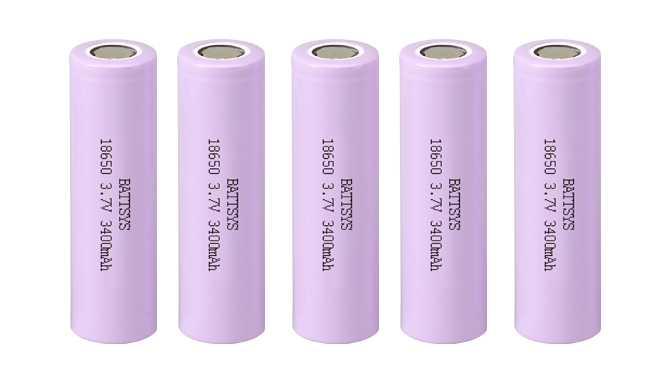Correct usage method of 18650 lithium battery.
When using lithium batteries, it should be noted that the battery enters a sleep state after being left for a period of time, at which point the capacity is lower than normal and the usage time is shortened accordingly. But lithium batteries are easy to activate, as long as they undergo 3-5 normal charge and discharge cycles to activate the battery and restore normal capacity. Due to the inherent characteristics of lithium batteries, they have almost no memory effect. Therefore, the new lithium battery in the user's mobile phone does not require any special methods or equipment during the activation process. Not only in theory, but also in my own practice, using standard charging methods from the beginning as a 'natural activation' approach is the best.

For the issue of "activation" of lithium batteries, many opinions suggest that the charging time must exceed 12 hours and be repeated three times in order to activate the battery. The statement that 'the first three charges should be charged for more than 12 hours' is clearly a continuation of nickel batteries such as nickel cadmium and nickel hydrogen. So this statement can be said to have been a misconception from the beginning. There is a significant difference in the charging and discharging characteristics between lithium batteries and nickel batteries, and it can be clearly stated that all the serious formal technical materials I have reviewed emphasize that overcharging and overdischarging can cause huge damage to lithium batteries, especially liquid lithium-ion batteries. Therefore, it is best to charge according to standard time and methods, especially not for over 12 hours of ultra long charging. Usually, the charging method described in the user manual is the standard charging method.
At the same time, long charging requires a long time and often needs to be carried out at night. Based on the situation of China's power grid, the voltage at night is relatively high and fluctuates greatly in many places. As mentioned earlier, lithium batteries are very delicate, and their ability to withstand fluctuations in charging and discharging is much worse than nickel batteries, which brings additional dangers.
In addition, another aspect that cannot be ignored is that
lithium batteries are also not suitable for over discharge, which is also detrimental to lithium batteries.
1、 When should charging start during normal use
This statement is often seen, because the number of charging and discharging cycles is limited, so the battery should be recharged as much as possible by using up all the electricity. But I found an experimental table about the charging and discharging cycles of lithium-ion batteries, and the data about the cycle life is listed as follows:
Cycle life (10% DOD):>1000 cycles
Cycle life (100% DOD):>200 cycles
DOD stands for Depth of Discharge. From the table, it can be seen that the number of rechargeable cycles is related to the depth of discharge, and the cycle life at 10% DOD is much longer than that at 100% DOD. Of course, if converted to the actual total charging capacity: 10% * 1000=100, 100% * 200=200, the latter's complete charging and discharging is still better. However, the statement made by the previous netizen needs some correction: under normal circumstances, you should charge according to the principle of using up the remaining battery before charging. But if your battery cannot last for two hours the next day, you should start charging in a timely manner. Of course, if you are willing to carry the charger to the office, that's another matter.
2、 You need to charge to cope with expected inconvenience or when conditions do not allow charging, even when the battery still has a lot of remaining power, so you only need to charge in advance, because you have not really lost "1" charging cycle life, which is only "0. x" times, and often this x will be very small.
The principle of recharging after the remaining battery power is not to go to extremes. A widely circulated saying, like long charging, is "try to use up the battery as much as possible, preferably with automatic shutdown". This approach is actually only used on nickel batteries to avoid memory effects, unfortunately it has also been passed down in lithium batteries today. Due to excessive discharge of the battery, the voltage is too low, making it unsuitable for normal charging and startup conditions.
3、 The correct approach to lithium batteries
In summary, my most important tip on the charging and discharging issues of lithium batteries during use is:
1. Charge according to standard time and procedures, even for the first three times;
2. When the battery level is too low, it is advisable to start charging as soon as possible;
3. The activation of lithium batteries does not require special methods, and they will naturally activate during normal use. If you insist on using the widely circulated "first three 12 hour long charging activation" method, it will not actually be effective.
Therefore, all the practices of pursuing 12-16 hour ultra long charging and using lithium batteries for automatic shutdown are wrong. If you have previously followed incorrect statements, please correct them in a timely manner, perhaps it is not too late.
matters needing attention:
Under the condition of good self-protection and control circuit quality of the original charger, there is still a considerable guarantee for the protection of lithium batteries. So understanding the charging rules is the key, and in some cases, some concessions can also be made. For example, if you think the battery must be charged before you go to bed at night, you can also start charging before bedtime. The key to the problem is that you should know what the correct approach is and not deliberately follow the wrong statements.
